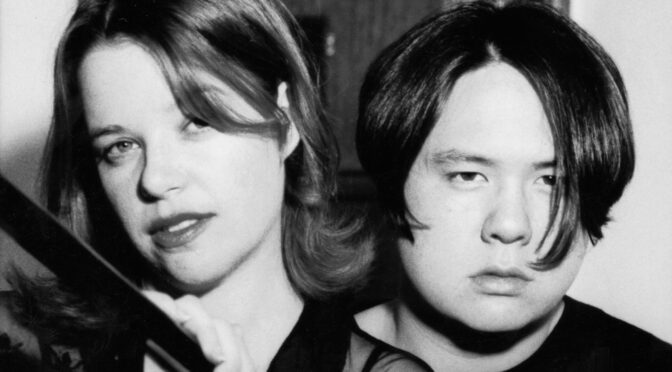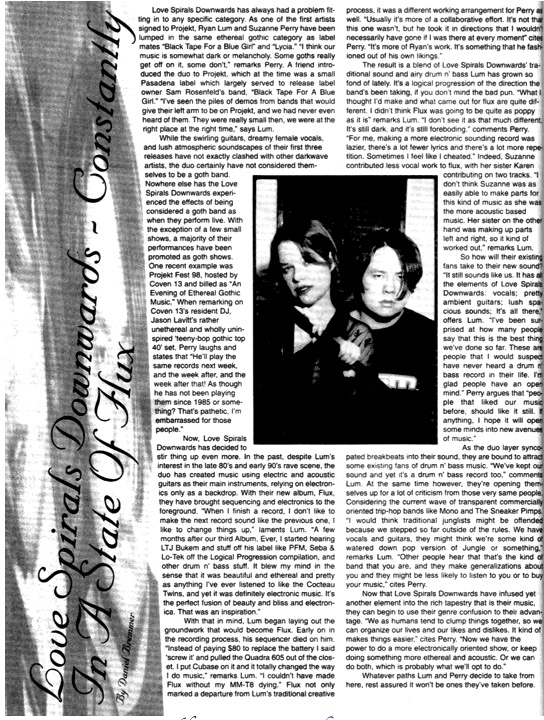Love Spirals Downwards – Constantly In A State Of Flux
By Daniel Bremmer
Love Spirals Downwards has always had a problem fitting in to any specific category. As on the first artists signed to Projekt, Ryan Lum and Suzanne Perry have been lumped in the same ethereal category as label mates Black Tape for a Blue Gil and Lycia. “I think our music is somewhat melancholy. Some goths really get off on it, some don’t,” remarks Perry. A friend introduced the duo to Projekt, which at the time were a small Pasadena label which largely served to release label owner Sam Rosenthal’s band, Black Tape for a Blue Girl. “I’ve seen the piles of demos from bands that would give their left arm to be on Projekt, and we had never even heard of them. They were really small then, we were at the right place at the right time,” says Lum.
While the swirling guitars, dreamy female vocals, and lush atmospheric landscapes of their first three releases have not exactly clashed with other dark wave artists, the duo have certainly not considered themselves to be a goth band. Nowhere else has Love Spirals Downwards experienced the effects of being considered a goth band as when they perform live. With the exception of a few small shows, a majority of their performances have been promoted as goth shows. One recent example was ProjektFest 98, hosted by Coven 13 and billed as “An Evening of Gothic Music.” When remarking on Coven 13’s resident DJ, Jason Levitt’s rather unethereal and wholly uninspired teeny-bop top 40 set, Perry laughs and states that “He’ll play the same records next week, and the week after, and the week after that! As though he has not been playing them since 1985 or something? That’s pathetic. I’m embarrassed for those people.”
Now Love Spirals Downwards has decided to stir things up even more. In the past, despite Lum’s interest in the late 80s and 90s rave scene, the duo has created music using electric and acoustic guitars as their main instruments, relying on electronics only as a backdrop. With their new album, Flux, they have brought sequencing and electronics to the foreground. “When I finish a record, I don’t like to make the next record sound like the previous one. I like to change things up,” laments Lum. “A few months after our third Album, Ever, I started hearing LTJ Bukem and stuff off his label like PFM, Seba & Lo-Tek off the Logical Progression compilation, and other drum n’ bass stuff. It blew my mind in the sense that it was beautiful and ethereal and pretty as anything I’ve ever listened to, like the Cocteau Twins, and yet it was definitely electronic music. It’s the perfect fusion of beauty and bliss and electronica. That was an inspiration.”
With that in mind, Lum began laying out the groundwork that would become Flux. Early on in the recording process, his sequencer died on him. “Instead of paying $80 to replace the battery I said ‘screw it’ and pulled the Quadra 605 out of the closet. I put Cubase on it and it totally changed the way I do music,” remarks Lum. “I couldn’t have made Flux without my MM-T8 dying.” Flux not only marked a departure from Lum’s traditional creative process, it was a different working arrangement for Perry as well. “Usually it’s more of a collaborative effort. It’s not that this one wasn’t, but he took it in directions that I wouldn’t necessarily have gone if I was there at every moment,” cites Perry. “It’s more of Ryan’s work. It’s something that he fashioned out of his own likings.“
The result is a blend of Love Spirals Downwards’ traditional sound and airy drum n’ bass Lum has grown so fond of lately. It’s a logical progression of the direction the band’s been taking, if you don’t mind the bad pun. “What I thought I’d make and what came out for Flux are quite different. I didn’t think Flux was going to be quite as poppy as it is,” remarks Lum. “I don’t see it as that much different. It’s still dark, and it’s still foreboding.” comments Perry.
“For me, making a more electronic sounding record was lazier, there’s a lot fewer lyrics and there’s a lot more repetition. Sometimes I feel like I cheated.” Indeed, Suzanne contributed less vocal work to Flux, with her sister Kristen contributing on two tracks. “I don’t think Suzanne was as easily able to make parts for this kind of music as she was the more acoustic based music. Her sister on the other hand was making up parts left and right, so it kind of worked out,” remarks Lum
So how will their existing fans take to their new sound? “It still sounds like us. It has al the elements of Love Spirals Downwards: vocals; pretty ambient guitars; lush spacious sounds; It’s all there,” offers Lum. “I’ve been surprised at how many people say that this is the best thing we’ve done so far. These are people that I would suspect have never heard a drum n bass record in their life. I’m glad people have an open mind.” Perry argues that “people that liked our music before, should like it still. If anything, I hope it will open some minds into new avenues of music.“
As the duo layer syncopated breakbeats into their sound, they are bound to attract some existing fans of drum n’ bass music. “We’ve kept our sound and yet it’s a drum n’ bass record too,” comments Lum. At the same time however, they’re opening themselves up for a lot of criticism from those very same people Considering the current wave of transparent commercially oriented trip hop bands like Mono and The Sneaker Pimps. “I would think traditional junglists might be offended because we stepped so far outside the rules. We have vocals and guitars, they might think we’re some kind of watered down pop version of jungle or something,” remarks Lum. “Other people hear that that’s the kind of band you are, and they make generalizations about you and they might be less likely to listen to you or to buy your music,” cites Perry.
Now that Love Spirals Downwards have infused yet another element into the rich tapestry of that is their music, they can begin to use their genre confusion to their advantage. “We as humans tend to clump things together, some can organize our lives and our likes and dislikes. It kind of makes things easier,” cites Perry. “Now we have the power to do a more electronically oriented show, or keep doing something more ethereal and acoustic. Or we can do both, which is probably what we’ll opt to do.”
Whatever path Lum and Perry decide to take from here, rest assured it won’t be ones they’e taken before.


